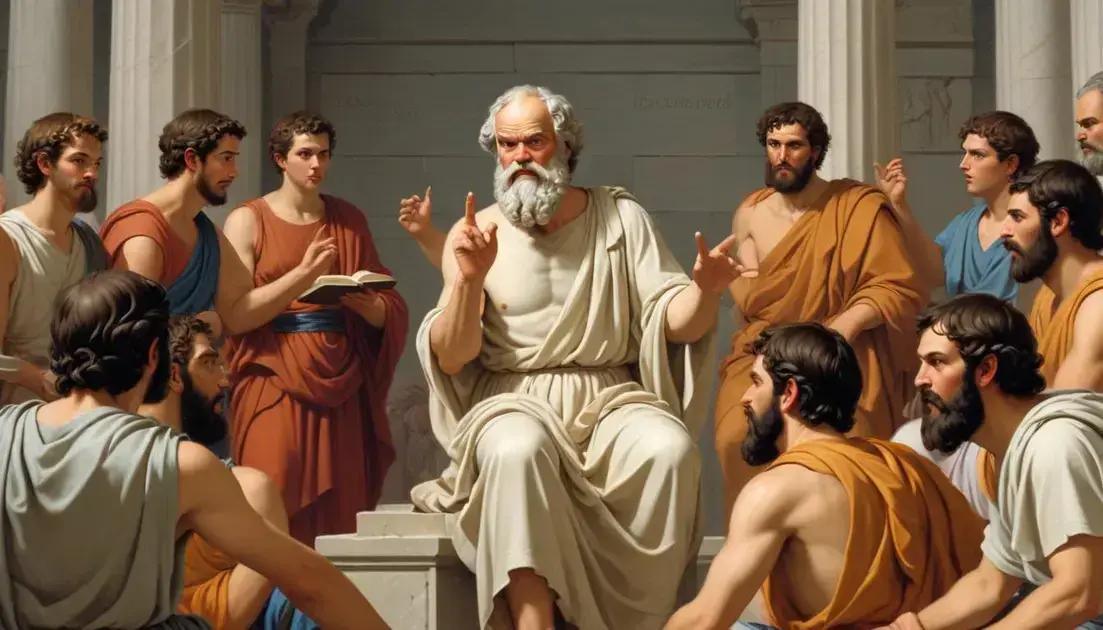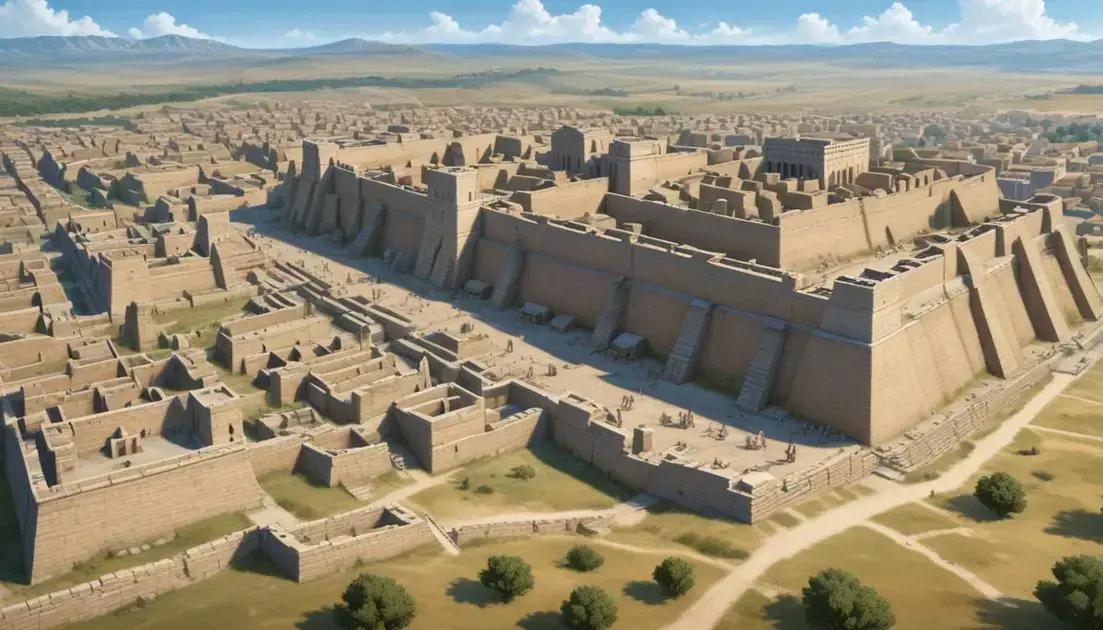
Socrates: The Birth of Critical Thinking
Socrates’ influence on critical thinking is profound, emphasizing the importance of dialogue and questioning. His method encourages individuals to explore ideas deeply, fostering a culture of inquiry. This legacy has shaped ethical discussions and personal growth by promoting open-mindedness and respect for diverse viewpoints. Educational systems and workplaces benefit from his approach as it enhances creativity and civic engagement, making critical thinking a vital skill for navigating modern challenges.
Socrates was more than just a philosopher; he was a master of inquiry and dialogue. His unique approach has profoundly influenced how we think today. Curious about how his techniques can inspire our own critical thinking? Let’s dive in!
Understanding Socrates’ Method
Understanding Socrates and his method can really change how we think and learn. Socrates believed in asking questions to clarify ideas. This method is called the Socratic Method.
Instead of just giving answers, he helped others find their own. This made discussions much more lively. People were encouraged to think critically and explore their own beliefs. It also fostered a sense of curiosity.
How the Socratic Method Works
In a typical discussion, Socrates would ask guiding questions. For example, “What do you mean by justice?” This type of question pushes for deeper understanding. Each answer leads to more questions, helping people examine their thoughts closely.
Socrates believed this method was a way to uncover truth. He thought that the more we questioned, the closer we got to understanding important ideas. By engaging, we also learn to respect differing opinions.
The Importance of Dialogue
Dialogue is at the heart of the Socratic method. Open discussions allow everyone to express their thoughts. It isn’t about being right or wrong; it’s about discovering new insights together.
Moreover, this method teaches critical thinking. When we question our ideas, we grow in knowledge. It encourages us to be more thoughtful in our daily lives. We start to appreciate diverse viewpoints, which enriches our experiences.
Using the Socratic method today can be helpful in classrooms, meetings, and even at home. It encourages everyone to think for themselves and share their ideas. This leads to a better understanding of the topics discussed.
The Importance of Dialogue in Philosophy
Dialogue plays a crucial role in philosophy. It’s not just about talking; it’s about exchanging ideas. Engaging in dialogue helps us understand complex thoughts better.
When we discuss various viewpoints, we open our minds to new perspectives. This back-and-forth communication encourages critical thinking. It challenges us to explore different angles on a topic.
The Process of Engaging in Dialogue
Socratic dialogue is all about asking questions. Each question leads us deeper into understanding. For example, asking someone, “Why do you believe that?” allows both parties to reflect.
This method of questioning makes discussions richer. It transforms a simple conversation into a thoughtful debate. The goal is to explore ideas until common ground is found.
Benefits of Philosophical Dialogue
Philosophical dialogue promotes personal growth. Through conversation, we learn to articulate our thoughts clearly. It also fosters respect for others’ opinions, even if they differ.
Moreover, dialogue can build community. Sharing thoughts creates connections. It brings people together, even if they have opposing views. This unity helps everyone feel heard and valued.
In classrooms, businesses, and everyday life, dialogue is important. It inspires creativity and collaboration. Without dialogue, we miss out on many valuable insights.
Socrates’ Influence on Future Philosophers
Socrates had a huge influence on future philosophers. His ideas laid the groundwork for many branches of philosophy. They shaped how we think about ethics, knowledge, and reason.
One major impact was on ability to question everything. Socratic questioning encourages deep thinking. It inspires later thinkers like Plato and Aristotle to develop their philosophies.
The Role of Socratic Method
His method of dialogue also set a standard. Philosophers began using discussion to explore ideas. This approach made philosophy more interactive and engaging.
Plato, a student of Socrates, wrote many dialogues. He used his teacher’s style to share important concepts. These texts continue to influence philosophy classes worldwide today.
Ethics and Morality
Socrates taught that ethics is about self-examination. He believed knowing oneself is key to living a good life. This idea influenced moral philosophy for centuries.
Later philosophers built on this view. They explored how ethical choices impact the world. This exploration remains vital in today’s discussions about right and wrong.
Even in modern philosophy, Socrates’ ideas endure. His emphasis on dialogue and questioning continues to inspire thinkers. They remind us that philosophy must be an active pursuit.
The Legacy of Critical Thinking
Critical thinking is a lasting legacy of Socrates. His method encouraged people to question and analyze their beliefs. This skill is crucial in today’s fast-paced world.
People use critical thinking to solve problems every day. It helps us make informed decisions in our personal and professional lives. When we think critically, we weigh evidence before coming to conclusions.
Importance of Critical Thinking
Critical thinking promotes open-mindedness. It encourages us to consider different viewpoints. This approach fosters understanding and respect among people.
It also enhances communication skills. When we articulate our thoughts clearly, we express ourselves better. This is essential in discussions, debates, and everyday conversations.
Applying Critical Thinking
We can apply critical thinking in many areas. In education, students learn to analyze texts and arguments. They evaluate sources critically, which prepares them for real-world challenges.
In the workplace, critical thinking leads to innovation. Employees who think critically can generate new ideas. They can identify problems and create effective solutions.
Moreover, critical thinking is vital for civic engagement. It allows citizens to evaluate social issues and participate actively. By thinking critically, we can contribute to healthier democracies.
Conclusion
In conclusion, the legacy of critical thinking remains vital in our lives today. Socrates’ influence teaches us to question and analyze information. This skill helps us make better decisions and understand diverse perspectives.
By embracing critical thinking, we enhance our communication skills and foster respect for others’ opinions. We can apply this mindset in education, work, and community life. With strong critical thinking, we can face challenges and contribute positively to society. Investing time to develop this skill is crucial for personal growth and a healthy democracy. In the end, critical thinking is not just a skill; it’s a valuable tool for navigating the world.


